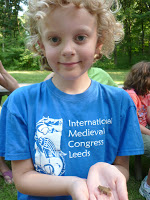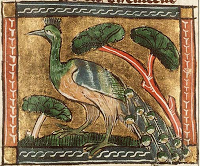Medieval History
 Wonder is relative. It's prized as a universal human value, but it's really quite relative. It can form groups, identities even (those who wonder, those who wonder at). It self-propagates linguistically (how would you define the fine line between wonder and wonderment?) which is, of course, wonderful. Mac's return was filled with wonder: the kids' glee, the (it's all true!) wondrous textiles of the Orient, the pictures (which are emerging slowly, each one its own incredible universe), the stories the stories the stories. We heard most of them around a campfire and in the woods, as we gathered in a state park for two nights of camping with Chicago friends. There, all of the ecocritical readings I've been doing were treated to delicious (and sometimes deliciously ironic) applications (let us just say that whatever the hell was sniffing around our tent that first night fulfilled every fear of every medieval monster ever). Camping is its own strange co-existence with nature, and camping with kids blurs even more boundaries. Oliver's instant happy bond with one of (it turned out) multiple frogs hopping all around was deep, and the frog's final leap into the void out of his hands was heartbreaking to him. The other, many other, frogs that would experience his joyous possession over the course of the two days were never quite the same - but they were plentiful. When Tiny took leave of Oliver for good, Oliver spoke of the event as Tiny's "return" to nature - even though we were all in the same forest-y midst, all absolutely surrounded by the same green and sounds and breezes, Tiny was returning somewhere, I think to Oliver's unknowing of him. Whereas, when Oliver held him, and felt him breathing and wriggling, knowledge (deeply satisfying knowledge, the knowledge of possession) was there. We discount children (and children's books and children's movies and children's imagination) because they make the mute world speak, they give it intention and agency. But, to quote Graham Harman's prescient line from his review of Jane Bennett's Vibrant Matter, "anthropomorphism may be needed to in order to counter anthropocentrism." Oliver's wonder of frogs was complicated and all-consuming, actually: thrill, possession, focus, understanding, emotion, loss. Since coming home, he has stopped speaking of frogs. Iris, on the other hand, doggedly typed in "frog" and (to my consternation) "pet" at the library yesterday and wouldn't you know it, there's a book on the topic. I don't yet know what we're in for, but we've been promised a "convincing presentation." The boundaries between human and non-human that I seek to critique in my classroom may yet break down in my home.
Wonder is relative. It's prized as a universal human value, but it's really quite relative. It can form groups, identities even (those who wonder, those who wonder at). It self-propagates linguistically (how would you define the fine line between wonder and wonderment?) which is, of course, wonderful. Mac's return was filled with wonder: the kids' glee, the (it's all true!) wondrous textiles of the Orient, the pictures (which are emerging slowly, each one its own incredible universe), the stories the stories the stories. We heard most of them around a campfire and in the woods, as we gathered in a state park for two nights of camping with Chicago friends. There, all of the ecocritical readings I've been doing were treated to delicious (and sometimes deliciously ironic) applications (let us just say that whatever the hell was sniffing around our tent that first night fulfilled every fear of every medieval monster ever). Camping is its own strange co-existence with nature, and camping with kids blurs even more boundaries. Oliver's instant happy bond with one of (it turned out) multiple frogs hopping all around was deep, and the frog's final leap into the void out of his hands was heartbreaking to him. The other, many other, frogs that would experience his joyous possession over the course of the two days were never quite the same - but they were plentiful. When Tiny took leave of Oliver for good, Oliver spoke of the event as Tiny's "return" to nature - even though we were all in the same forest-y midst, all absolutely surrounded by the same green and sounds and breezes, Tiny was returning somewhere, I think to Oliver's unknowing of him. Whereas, when Oliver held him, and felt him breathing and wriggling, knowledge (deeply satisfying knowledge, the knowledge of possession) was there. We discount children (and children's books and children's movies and children's imagination) because they make the mute world speak, they give it intention and agency. But, to quote Graham Harman's prescient line from his review of Jane Bennett's Vibrant Matter, "anthropomorphism may be needed to in order to counter anthropocentrism." Oliver's wonder of frogs was complicated and all-consuming, actually: thrill, possession, focus, understanding, emotion, loss. Since coming home, he has stopped speaking of frogs. Iris, on the other hand, doggedly typed in "frog" and (to my consternation) "pet" at the library yesterday and wouldn't you know it, there's a book on the topic. I don't yet know what we're in for, but we've been promised a "convincing presentation." The boundaries between human and non-human that I seek to critique in my classroom may yet break down in my home.
Of all the images that Mac has given us to wonder at, consider, turn over in our minds and ask each other about, the one of a peacock flying up to sit on power lines on the highway between New Delhi and Agra has gripped me completely. It's the incongruity at first, and makes me realize that much of wonder is embedded in the incongruous, and that much of the relativity of wonder is caught up in the relativity of incongruity (what doesn't fit for me, may have always fit for you). A peacock on a power line may well be mundane, if not downright annoying, to the inhabitants of New Delhi. It elicited little wonder within medieval bestiaries, where it is cited for its tough meat and horrific and disconcerting shriek. But, God, is it ever wondrous to me. A jewel of a bird, whose magical sighting is prized and kept in zoos in my experience, perching atop what I have to realize is actually another kind of wonder: a power line that feeds an electrical grid that services the nearly 20 million people living in New Delhi (that's half the population of France if you want a relative scale). That kind of population creates some very slow traffic and it took them about two hours to get out of the city - plenty of time for Mac to see the peacock's wanderings, its graceful swoops and moves in establishing its bird's eye view of the traffic river below. Is it wondrous because it shouldn't be possible but it is? Because the two parts don't fit yet co-exist? There are opportunities for (big? political? symbolic?) statements to be made within wonder sparked by incongruity. Is that peacock on a power line wondrous because it's unexpected yet absolute? Because it provides that veristic detail (think of the uses of animals in Alexander's letter to Aristotle) that reminds me with renewed wonder each time that my dear Mac was really, truly in India? Because it defies expectation? I can't discount the possibility that it's the alliteration, too.
- These Days
And then there are extraordinary ordinary days. Like when your brother and his awesome wife and their two fantastic boys come to where you live, and you find yourself very soon at the park and the kids are running around and maybe you've actually...
- Home. Here. Home.
That old tree in that one place.I don't know where to begin. How to separate out any emotion enough to see it and write about it. It's not that there are so many (happiness, gladness, wonder, and memory really are it), it's that they're...
- Children, Nature, Selves
The return from Atlanta has been a deep nesting experience (the exact opposite of Mac's days in India which have been unfurling in more and more extraordinary ways). The fifteen (!) boxes of glorious books from my beloved Donna have emerged,...
- Happy Birthday, Oliver
These ten days between Eleanor's birthday and Oliver's are always the craziest: turning grades in, saying good-bye to students, graduation, cleaning out the office, oh and there's a wedding anniversary in there somewhere. This summer,...
- Glimpses
Oliver's been questioning Santa's existence, though at this point he has "no evidence that Santa does not exist," as he puts it. But, crafty kid that he is, he thought of leaving the iPhone with its built-in camera and asking Santa in the...
Medieval History
Peacocks on Power Lines
 |
| Peacock from a Medieval Bestiary |
- These Days
And then there are extraordinary ordinary days. Like when your brother and his awesome wife and their two fantastic boys come to where you live, and you find yourself very soon at the park and the kids are running around and maybe you've actually...
- Home. Here. Home.
That old tree in that one place.I don't know where to begin. How to separate out any emotion enough to see it and write about it. It's not that there are so many (happiness, gladness, wonder, and memory really are it), it's that they're...
- Children, Nature, Selves
The return from Atlanta has been a deep nesting experience (the exact opposite of Mac's days in India which have been unfurling in more and more extraordinary ways). The fifteen (!) boxes of glorious books from my beloved Donna have emerged,...
- Happy Birthday, Oliver
These ten days between Eleanor's birthday and Oliver's are always the craziest: turning grades in, saying good-bye to students, graduation, cleaning out the office, oh and there's a wedding anniversary in there somewhere. This summer,...
- Glimpses
Oliver's been questioning Santa's existence, though at this point he has "no evidence that Santa does not exist," as he puts it. But, crafty kid that he is, he thought of leaving the iPhone with its built-in camera and asking Santa in the...
